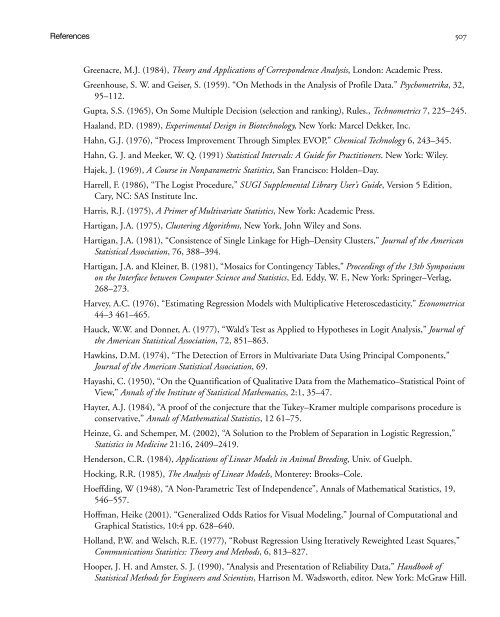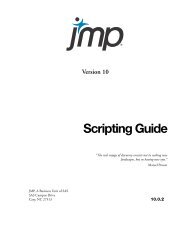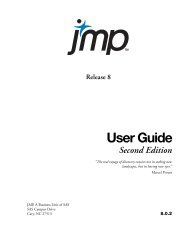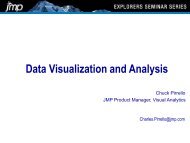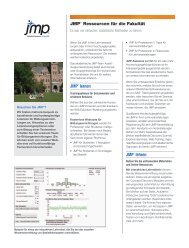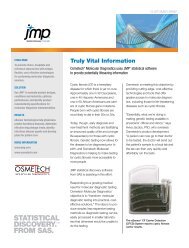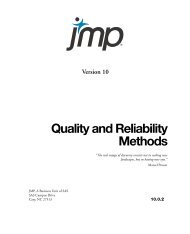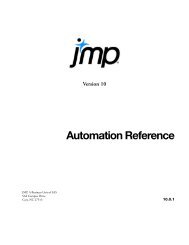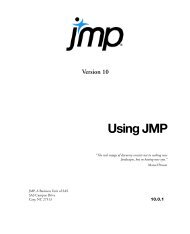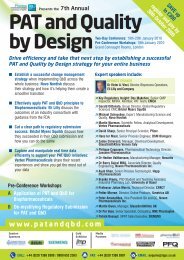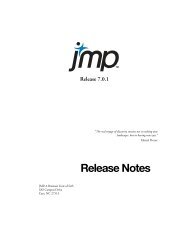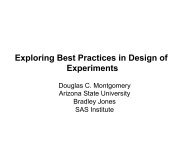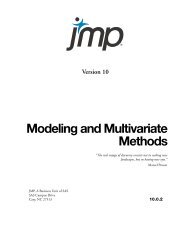- Page 1 and 2:
Version 10 Basic Analysis and Graph
- Page 3:
USE, DATA OR PROFITS, WHETHER IN AN
- Page 6 and 7:
6 Options for Categorical Variables
- Page 8 and 9:
8 Nonparametric Bivariate Density R
- Page 10 and 11:
10 Example of the Power Option . .
- Page 12 and 13:
12 Statistical Details for the Logi
- Page 14 and 15:
14 Use Categorical Variables . . .
- Page 16 and 17:
16 Control Animation for Dynamic Bu
- Page 18 and 19:
18 Launch the Scatterplot Matrix Pl
- Page 20 and 21:
Contents Book Conventions. . . . .
- Page 22 and 23:
22 Learn about JMP Chapter 1 Book C
- Page 24 and 25:
24 Learn about JMP Chapter 1 Book C
- Page 26 and 27:
26 Learn about JMP Chapter 1 Additi
- Page 28 and 29:
28 Learn about JMP Chapter 1 Additi
- Page 30 and 31:
Contents Overview of the Distributi
- Page 32 and 33:
32 Performing Univariate Analysis C
- Page 34 and 35:
34 Performing Univariate Analysis C
- Page 36 and 37:
36 Performing Univariate Analysis C
- Page 38 and 39:
38 Performing Univariate Analysis C
- Page 40 and 41:
40 Performing Univariate Analysis C
- Page 42 and 43:
42 Performing Univariate Analysis C
- Page 44 and 45:
44 Performing Univariate Analysis C
- Page 46 and 47:
46 Performing Univariate Analysis C
- Page 48 and 49:
48 Performing Univariate Analysis C
- Page 50 and 51:
50 Performing Univariate Analysis C
- Page 52 and 53:
52 Performing Univariate Analysis C
- Page 54 and 55:
54 Performing Univariate Analysis C
- Page 56 and 57:
56 Performing Univariate Analysis C
- Page 58 and 59:
58 Performing Univariate Analysis C
- Page 60 and 61:
60 Performing Univariate Analysis C
- Page 62 and 63:
62 Performing Univariate Analysis C
- Page 64 and 65:
64 Performing Univariate Analysis C
- Page 66 and 67:
66 Performing Univariate Analysis C
- Page 68 and 69:
68 Performing Univariate Analysis C
- Page 70 and 71:
70 Performing Univariate Analysis C
- Page 72 and 73:
72 Performing Univariate Analysis C
- Page 74 and 75:
74 Performing Univariate Analysis C
- Page 76 and 77:
76 Performing Univariate Analysis C
- Page 78 and 79:
78 Performing Univariate Analysis C
- Page 80 and 81:
80 Performing Univariate Analysis C
- Page 82 and 83:
82 Performing Univariate Analysis C
- Page 84 and 85:
84 Performing Univariate Analysis C
- Page 86 and 87:
86 Performing Univariate Analysis C
- Page 88 and 89:
Contents Overview of the Fit Y by X
- Page 90 and 91:
90 Introduction to the Fit Y by X P
- Page 92 and 93:
Contents Example of Bivariate Analy
- Page 94 and 95:
94 Performing Bivariate Analysis Ch
- Page 96 and 97:
96 Performing Bivariate Analysis Ch
- Page 98 and 99:
98 Performing Bivariate Analysis Ch
- Page 100 and 101:
100 Performing Bivariate Analysis C
- Page 102 and 103:
102 Performing Bivariate Analysis C
- Page 104 and 105:
104 Performing Bivariate Analysis C
- Page 106 and 107:
106 Performing Bivariate Analysis C
- Page 108 and 109:
108 Performing Bivariate Analysis C
- Page 110 and 111:
110 Performing Bivariate Analysis C
- Page 112 and 113:
112 Performing Bivariate Analysis C
- Page 114 and 115:
114 Performing Bivariate Analysis C
- Page 116 and 117:
116 Performing Bivariate Analysis C
- Page 118 and 119:
118 Performing Bivariate Analysis C
- Page 120 and 121:
120 Performing Bivariate Analysis C
- Page 122 and 123:
122 Performing Bivariate Analysis C
- Page 124 and 125:
124 Performing Bivariate Analysis C
- Page 126 and 127:
126 Performing Bivariate Analysis C
- Page 128 and 129:
Contents Overview of Oneway Analysi
- Page 130 and 131:
130 Performing Oneway Analysis Chap
- Page 132 and 133:
132 Performing Oneway Analysis Chap
- Page 134 and 135:
134 Performing Oneway Analysis Chap
- Page 136 and 137:
136 Performing Oneway Analysis Chap
- Page 138 and 139:
138 Performing Oneway Analysis Chap
- Page 140 and 141:
140 Performing Oneway Analysis Chap
- Page 142 and 143:
142 Performing Oneway Analysis Chap
- Page 144 and 145:
144 Performing Oneway Analysis Chap
- Page 146 and 147:
146 Performing Oneway Analysis Chap
- Page 148 and 149:
148 Performing Oneway Analysis Chap
- Page 150 and 151:
150 Performing Oneway Analysis Chap
- Page 152 and 153:
152 Performing Oneway Analysis Chap
- Page 154 and 155:
154 Performing Oneway Analysis Chap
- Page 156 and 157:
156 Performing Oneway Analysis Chap
- Page 158 and 159:
158 Performing Oneway Analysis Chap
- Page 160 and 161:
160 Performing Oneway Analysis Chap
- Page 162 and 163:
162 Performing Oneway Analysis Chap
- Page 164 and 165:
164 Performing Oneway Analysis Chap
- Page 166 and 167:
166 Performing Oneway Analysis Chap
- Page 168 and 169:
168 Performing Oneway Analysis Chap
- Page 170 and 171:
170 Performing Oneway Analysis Chap
- Page 172 and 173:
172 Performing Oneway Analysis Chap
- Page 174 and 175:
174 Performing Oneway Analysis Chap
- Page 176 and 177:
176 Performing Oneway Analysis Chap
- Page 178 and 179:
178 Performing Oneway Analysis Chap
- Page 180 and 181:
180 Performing Oneway Analysis Chap
- Page 182 and 183:
182 Performing Oneway Analysis Chap
- Page 184 and 185:
Contents Example of Contingency Ana
- Page 186 and 187:
186 Performing Contingency Analysis
- Page 188 and 189:
188 Performing Contingency Analysis
- Page 190 and 191:
190 Performing Contingency Analysis
- Page 192 and 193:
192 Performing Contingency Analysis
- Page 194 and 195:
194 Performing Contingency Analysis
- Page 196 and 197:
196 Performing Contingency Analysis
- Page 198 and 199:
198 Performing Contingency Analysis
- Page 200 and 201:
200 Performing Contingency Analysis
- Page 202 and 203:
202 Performing Contingency Analysis
- Page 204 and 205:
204 Performing Contingency Analysis
- Page 206 and 207:
206 Performing Contingency Analysis
- Page 208 and 209:
208 Performing Contingency Analysis
- Page 210 and 211:
210 Performing Contingency Analysis
- Page 212 and 213:
212 Performing Contingency Analysis
- Page 214 and 215:
214 Performing Contingency Analysis
- Page 216 and 217:
Contents Overview of Logistic Regre
- Page 218 and 219:
218 Performing Simple Logistic Regr
- Page 220 and 221:
220 Performing Simple Logistic Regr
- Page 222 and 223:
222 Performing Simple Logistic Regr
- Page 224 and 225:
224 Performing Simple Logistic Regr
- Page 226 and 227:
226 Performing Simple Logistic Regr
- Page 228 and 229:
228 Performing Simple Logistic Regr
- Page 230 and 231:
230 Performing Simple Logistic Regr
- Page 232 and 233:
232 Performing Simple Logistic Regr
- Page 234 and 235:
234 Performing Simple Logistic Regr
- Page 236 and 237:
Contents Overview of the Matched Pa
- Page 238 and 239:
238 Comparing Paired Data Chapter 8
- Page 240 and 241:
240 Comparing Paired Data Chapter 8
- Page 242 and 243:
242 Comparing Paired Data Chapter 8
- Page 244 and 245:
244 Comparing Paired Data Chapter 8
- Page 246 and 247:
246 Comparing Paired Data Chapter 8
- Page 248 and 249:
Contents Example of Bootstrapping .
- Page 250 and 251:
250 Bootstrapping Chapter 9 Example
- Page 252 and 253:
252 Bootstrapping Chapter 9 Unstack
- Page 254 and 255:
254 Bootstrapping Chapter 9 Analysi
- Page 256 and 257:
Contents Overview of Graph Builder
- Page 258 and 259:
258 Interactive Data Visualization
- Page 260 and 261:
260 Interactive Data Visualization
- Page 262 and 263:
262 Interactive Data Visualization
- Page 264 and 265:
264 Interactive Data Visualization
- Page 266 and 267:
266 Interactive Data Visualization
- Page 268 and 269:
268 Interactive Data Visualization
- Page 270 and 271:
270 Interactive Data Visualization
- Page 272 and 273:
272 Interactive Data Visualization
- Page 274 and 275:
274 Interactive Data Visualization
- Page 276 and 277:
276 Interactive Data Visualization
- Page 278 and 279:
278 Interactive Data Visualization
- Page 280 and 281:
280 Interactive Data Visualization
- Page 282 and 283:
282 Interactive Data Visualization
- Page 284 and 285:
284 Interactive Data Visualization
- Page 286 and 287:
286 Interactive Data Visualization
- Page 288 and 289:
288 Interactive Data Visualization
- Page 290 and 291:
290 Interactive Data Visualization
- Page 292 and 293:
292 Interactive Data Visualization
- Page 294 and 295:
294 Interactive Data Visualization
- Page 296 and 297:
296 Interactive Data Visualization
- Page 298 and 299:
298 Interactive Data Visualization
- Page 300 and 301:
300 Interactive Data Visualization
- Page 302 and 303:
302 Interactive Data Visualization
- Page 304 and 305:
304 Interactive Data Visualization
- Page 306 and 307:
306 Interactive Data Visualization
- Page 308 and 309:
308 Interactive Data Visualization
- Page 310 and 311:
310 Interactive Data Visualization
- Page 312 and 313:
Contents Example of the Chart Platf
- Page 314 and 315:
314 Creating Summary Charts Chapter
- Page 316 and 317:
316 Creating Summary Charts Chapter
- Page 318 and 319:
318 Creating Summary Charts Chapter
- Page 320 and 321:
320 Creating Summary Charts Chapter
- Page 322 and 323:
322 Creating Summary Charts Chapter
- Page 324 and 325:
324 Creating Summary Charts Chapter
- Page 326 and 327:
326 Creating Summary Charts Chapter
- Page 328 and 329:
328 Creating Summary Charts Chapter
- Page 330 and 331:
330 Creating Summary Charts Chapter
- Page 332 and 333:
332 Creating Summary Charts Chapter
- Page 334 and 335:
334 Creating Summary Charts Chapter
- Page 336 and 337:
336 Creating Summary Charts Chapter
- Page 338 and 339:
Contents Example of an Overlay Plot
- Page 340 and 341:
340 Creating Overlay Plots Chapter
- Page 342 and 343:
342 Creating Overlay Plots Chapter
- Page 344 and 345:
344 Creating Overlay Plots Chapter
- Page 346 and 347:
346 Creating Overlay Plots Chapter
- Page 348 and 349:
348 Creating Overlay Plots Chapter
- Page 350 and 351:
350 Creating Overlay Plots Chapter
- Page 352 and 353:
Contents Example of a 3D Scatterplo
- Page 354 and 355:
354 Creating Three-Dimensional Scat
- Page 356 and 357:
356 Creating Three-Dimensional Scat
- Page 358 and 359:
358 Creating Three-Dimensional Scat
- Page 360 and 361:
360 Creating Three-Dimensional Scat
- Page 362 and 363:
362 Creating Three-Dimensional Scat
- Page 364 and 365:
364 Creating Three-Dimensional Scat
- Page 366 and 367:
366 Creating Three-Dimensional Scat
- Page 368 and 369:
368 Creating Three-Dimensional Scat
- Page 370 and 371:
370 Creating Three-Dimensional Scat
- Page 372 and 373:
Contents Example of a Contour Plot
- Page 374 and 375:
374 Creating Contour Plots Chapter
- Page 376 and 377:
376 Creating Contour Plots Chapter
- Page 378 and 379:
378 Creating Contour Plots Chapter
- Page 380 and 381:
380 Creating Contour Plots Chapter
- Page 382 and 383:
Contents Example of a Dynamic Bubbl
- Page 384 and 385:
384 Creating Bubble Plots Chapter 1
- Page 386 and 387:
386 Creating Bubble Plots Chapter 1
- Page 388 and 389:
388 Creating Bubble Plots Chapter 1
- Page 390 and 391:
390 Creating Bubble Plots Chapter 1
- Page 392 and 393:
392 Creating Bubble Plots Chapter 1
- Page 394 and 395:
394 Creating Bubble Plots Chapter 1
- Page 396 and 397:
396 Creating Bubble Plots Chapter 1
- Page 398 and 399:
398 Creating Bubble Plots Chapter 1
- Page 400 and 401:
400 Creating Bubble Plots Chapter 1
- Page 402 and 403:
402 Creating Bubble Plots Chapter 1
- Page 404 and 405:
Contents Overview of Mapping . . .
- Page 406 and 407:
406 Creating Maps Chapter 16 Exampl
- Page 408 and 409:
408 Creating Maps Chapter 16 Exampl
- Page 410 and 411:
410 Creating Maps Chapter 16 Exampl
- Page 412 and 413:
412 Creating Maps Chapter 16 Exampl
- Page 414 and 415:
414 Creating Maps Chapter 16 Exampl
- Page 416 and 417:
416 Creating Maps Chapter 16 Exampl
- Page 418 and 419:
418 Creating Maps Chapter 16 Backgr
- Page 420 and 421:
420 Creating Maps Chapter 16 Backgr
- Page 422 and 423:
422 Creating Maps Chapter 16 Backgr
- Page 424 and 425:
424 Creating Maps Chapter 16 Backgr
- Page 426 and 427:
426 Creating Maps Chapter 16 Backgr
- Page 428 and 429:
428 Creating Maps Chapter 16 Exampl
- Page 430 and 431:
430 Creating Maps Chapter 16 Exampl
- Page 432 and 433:
432 Creating Maps Chapter 16 Exampl
- Page 434 and 435:
434 Creating Maps Chapter 16 Exampl
- Page 436 and 437:
436 Creating Maps Chapter 16 Exampl
- Page 438 and 439:
438 Creating Maps Chapter 16 Exampl
- Page 440 and 441:
440 Creating Maps Chapter 16 Exampl
- Page 442 and 443:
442 Creating Maps Chapter 16 Exampl
- Page 444 and 445:
444 Creating Maps Chapter 16 Exampl
- Page 446 and 447:
446 Creating Maps Chapter 16 Exampl
- Page 448 and 449:
Contents Example of a Parallel Plot
- Page 450 and 451:
450 Creating Parallel Plots Chapter
- Page 452 and 453:
452 Creating Parallel Plots Chapter
- Page 454 and 455:
454 Creating Parallel Plots Chapter
- Page 456 and 457: 456 Creating Parallel Plots Chapter
- Page 458 and 459: Contents Example of a Cell Plot. .
- Page 460 and 461: 460 Creating Cell Plots Chapter 18
- Page 462 and 463: 462 Creating Cell Plots Chapter 18
- Page 464 and 465: 464 Creating Cell Plots Chapter 18
- Page 466 and 467: Contents Example of Tree Maps . . .
- Page 468 and 469: 468 Creating Tree Maps Chapter 19 E
- Page 470 and 471: 470 Creating Tree Maps Chapter 19 E
- Page 472 and 473: 472 Creating Tree Maps Chapter 19 T
- Page 474 and 475: 474 Creating Tree Maps Chapter 19 A
- Page 476 and 477: 476 Creating Tree Maps Chapter 19 A
- Page 478 and 479: 478 Creating Tree Maps Chapter 19 A
- Page 480 and 481: 480 Creating Tree Maps Chapter 19 A
- Page 482 and 483: 482 Creating Tree Maps Chapter 19 A
- Page 484 and 485: Contents Example of a Scatterplot M
- Page 486 and 487: 486 Creating Scatterplot Matrices C
- Page 488 and 489: 488 Creating Scatterplot Matrices C
- Page 490 and 491: 490 Creating Scatterplot Matrices C
- Page 492 and 493: 492 Creating Scatterplot Matrices C
- Page 494 and 495: Contents Example of a Ternary Plot
- Page 496 and 497: 496 Creating Ternary Plots Chapter
- Page 498 and 499: 498 Creating Ternary Plots Chapter
- Page 500 and 501: 500 Creating Ternary Plots Chapter
- Page 502 and 503: 502 Creating Ternary Plots Chapter
- Page 504 and 505: 504 References Becker, R.A. and Cle
- Page 508 and 509: 508 References Hosmer, D.W. and Lem
- Page 510 and 511: 510 References McLachlan, G.J. and
- Page 512 and 513: 512 References Robertson, T., Wrigh
- Page 514 and 515: 514 References Wadsworth, H. M., St
- Page 516 and 517: 516 Index examples 459, 463-464 lau
- Page 518 and 519: 518 Index Horizontal option 268, 32
- Page 520 and 521: 520 Index Proportion of Densities o
- Page 522: 522 Index examples 467-468, 473-482


